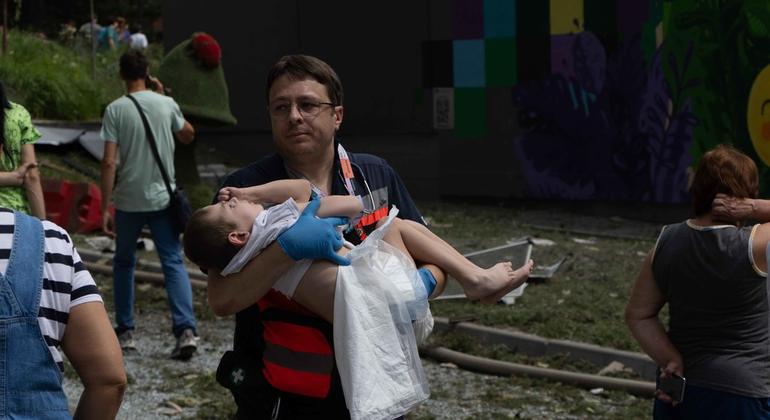The recent attacks on a children’s hospital in Ukraine have left a devastating impact on the community. The airstrikes on Monday not only damaged the Okhmatdyt Children’s Hospital but also caused destruction to 130 other buildings in the vicinity. Rescue operations have been ongoing to clear the wreckage and provide support to those affected by the attacks.
Government officials and partners on the ground have reported that six children injured in the attack are currently receiving aid. Additionally, around 600 child patients have been transferred to various medical facilities in the city and surrounding areas for further care. Organizations such as OCHA have been working tirelessly to provide emergency medical and psychological support to those affected. They have also distributed drinking water, hygiene kits, and other essential items to civilians in need.
Moreover, aid workers have been registering people for cash assistance, especially families who have lost loved ones or whose homes have been damaged in the attacks. Various UN agencies, including the World Health Organization (WHO), are collaborating with medical personnel to offer aid and medical equipment to those in need.
Meanwhile, in Libya, there has been a call for the release of a political activist who was recently abducted in the city of Misrata. Al-Moatassim Al-Areebi, 29, was taken on Monday, and his current whereabouts remain unknown. The UN Support Mission in Libya (UNSMIL) has expressed deep concern over his abduction and has urged the city’s security and law enforcement agencies to investigate the matter urgently and ensure his safe release.
UNSMIL has documented cases of at least 60 individuals who are currently detained across Libya due to their political affiliations. The Mission has called for the immediate and unconditional release of all arbitrarily detained individuals and has emphasized the need for accountability for those responsible for such detentions.
In a related development, a new report from the UN Food and Agriculture Organization (FAO) has highlighted the potential impact of climate change on fish stocks worldwide. The report warns that climate change could severely affect fish biomass in nearly every ocean region, posing a threat to major fishing nations and countries that rely heavily on seafood.
According to the FAO report, global estimates show a decrease of more than 10 percent in exploitable fish biomass by mid-century in many regions, particularly under high-emissions scenarios. By the end of the century, a warming of three to four degrees Celsius could lead to significant declines in fish biomass in 48 countries and territories.
However, the report also suggests that if emissions are kept low, 178 countries and territories may experience little to no change in fish populations. This emphasizes the urgent need for global action to mitigate the impacts of climate change on marine ecosystems and ensure the sustainability of fish stocks for future generations.
Overall, these recent events highlight the importance of international cooperation and support in addressing humanitarian crises, human rights violations, and environmental challenges. It is crucial for governments, organizations, and individuals to work together to promote peace, justice, and sustainability in the face of adversity.









